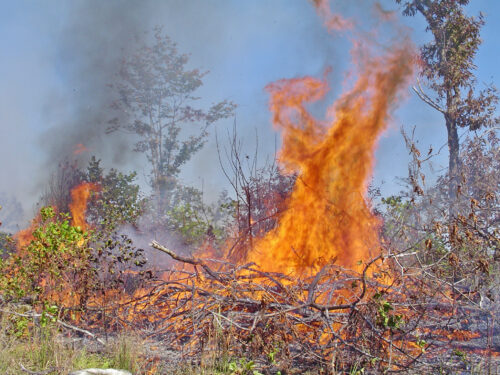 Debris Burning
Debris Burning
Burning yard trimmings or leaves is a common practice, but a dangerous one. Winds can blow burning yard waste and embers far off site and ignite combustible vegetation. Fall and spring are ideal times to reduce excess vegetation around your home that could pose an escaped fire threat. Escaped debris burns are the leading human cause of wildfire in Virginia. However, you can burn safely and legally, if you follow safe burning practices.
The 4 Pm Burning Law is in effect February 15 to April 30, restricting open air burning until after 4:00 p.m.
Learn about any current county burn restrictions, view VDOF’s Burn Ban Map.
Is burning your only option? Chipping, composting, or building brush piles for wildlife may be alternatives. If burning is the best or only option, please follow these guidelines:
- Call before you burn yard debris. Check with your local fire department, the Virginia Department of Forestry office, or the Air Protection Authority (Virginia Department of Environmental Quality) to learn if there are any burning restrictions and if a permit is required.
- Know the weather forecast. Never burn on dry or windy days because it is easy for fire to spread out of control.
- Burn only yard debris. State regulations prohibit the open burning of any material that creates dense smoke or noxious odors. No one in Virginia may burn tires or other hazardous materials at any time.
- Keep your burn pile small or use a burn barrel. Clear at least a 15-foot radius around a barrel and at least a 25-foot radius around a burn pile, and make sure there are no tree branches or power lines above. Wet down the surrounding area before, during, and after the burn.
- Always have water and fire tools on site. Keep a water-charged hose, a bucket of water, a shovel, and dirt or sand nearby to extinguish the fire.
- Stay with the fire. Virginia law requires that you monitor a debris burn continually from start to finish, until the fire is completely out.
- Extinguish the fire. Drown the burn pile with water, stir the coals, and drown again. Repeat until the fire is completely out.
Recheck the fire. Go back and recheck old burn piles, as they can retain heat for several weeks and rekindle when the weather warms and the wind begins to blow. - Call 911. If your fire escapes or gets beyond your control, call 911 immediately; even a slight delay may be disastrous. Do NOT try and fight the fire unless it is small and you can do so safely and easily. Leave this up to the trained firefighters.
- Caution. You may be using different types of small equipment when working in the yard. Lawn mowers and chainsaws are examples of equipment that can cause a wildfire when sparks ignite vegetation such as grass, weeds, or leaves.
Additional Resources
[posts_table columns="image,title:Title,cf:id_number:ID,content:Description,tax:Media,button" post_type="document-library" rows_per_page="5" exclude_term="Audiences:no, Media:news-releases" term="document-tags:burning" filters="tax:document-category:Select Category,tax:Media:Select Content Type" search_box="true" reset_button="true"]Smokey Bear’s official website offers some excellent information on safe outdoor burning.
Contact Us
For more information or questions, e-mail us or use our contact form.
